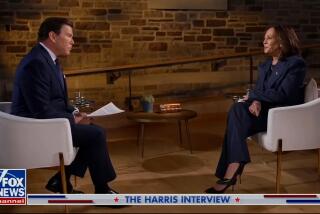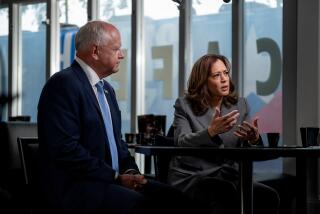Their Small but Select Audience
- Share via
The list of celebrity talk options doesn’t end with Jay, Dave, Oprah and Rosie. In fact, it barely even begins there.
As the most economical television genre to produce, talk is a favorite means of filling the demand for programming created by an ever-expanding array of channels, providing stars plenty of places to tout projects. In the process, even some programs with small ratings--including CNN’s “Larry King Live” and PBS’ “Charlie Rose”--have become prime destinations.
Rose averaged roughly 500,000 viewers last season--a pittance compared to “The Tonight Show,” and fewer than the nearly 1.7 million who watch CBS’ Tom Snyder or even the 740,000 averaged by King, whose cable show is available in just 7 of 10 homes.
Still, while small compared to prime-time standards or even top late-night and daytime fare, half a million is still the numerical equivalent of a best-selling book or a gold album. PBS also notes that Rose’s viewers have the highest income level of any public television program--a media-savvy audience that those in the entertainment industry want to reach. Roughly a fifth of viewers are in New York, where Rose does much better than in Los Angeles.
Rose’s show “is used as a resource for other members of the media,” says Alan Nierob, an executive vice president at Rogers & Cowan who represents such clients as Mel Gibson and Denzel Washington.
Publicists and stars especially welcome the formats offered by Rose and King, who generally conduct longer interviews and have reputations for pitching softball questions.
Says one show booker: “The real reason celebrities like those shows is they get 40 minutes without being asked difficult questions. Winona Ryder can put on her glasses and it feeds an image that she’s more than just a star.”
“I have yet to see an actor who isn’t dying to do ‘Charlie Rose,’ ” says a studio publicist, citing similar motivations for “Larry King” because he “makes you look really smart.”
Publicists say there are pragmatic reasons to let clients appear on some lesser venues as well. The biggest shows tend to be choosy about which guests they’ll book, so scheduling performers elsewhere is preferable to generating no publicity at all.
“A lot of times you do stuff just to make yourself look good,” acknowledges a senior studio publicist.
Stars also agree to do other shows when they’ll be in New York anyway to do “David Letterman” or “Rosie O’Donnell.” If there turns out to be a time crunch, those other dates can be eliminated.
“You like to give everyone a shot if there’s time,” says Nierob, who adds: “Sometimes when you set interviews for people, you do it for their own stimulation, not just for exposure’s sake.”
Yet even smaller shows are concerned about where they stand in the pecking order.
As one Rose employee put it: “Charlie knows he can’t be first, but he doesn’t want to wind up eighth or ninth. And if we tell him the person has done ‘Larry King,’ he gets pissy.” Rose temporarily banned clients from one big publishing firm after one of its authors first appeared on King’s show.
Even little-seen networks such as Fox News Channel which features an interview show hosted by Catherine Crier, can land guests by responding quickly when notified a star is available. Such logic would seem to ensure that every interviewer--no matter what size the audience--will always have someone to talk to.
More to Read
The biggest entertainment stories
Get our big stories about Hollywood, film, television, music, arts, culture and more right in your inbox as soon as they publish.
You may occasionally receive promotional content from the Los Angeles Times.










